#the first book of urizen
Explore tagged Tumblr posts
Text
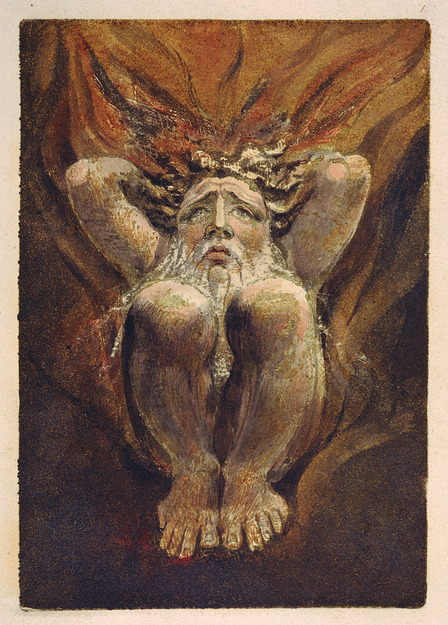
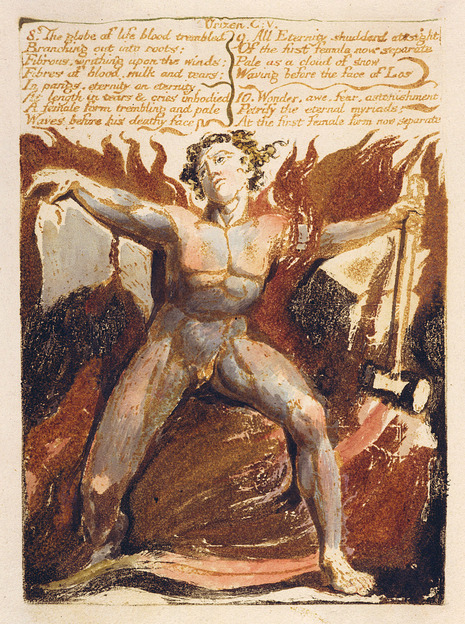
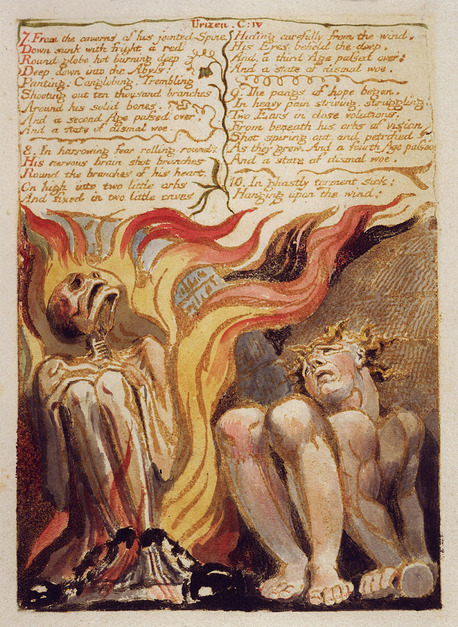

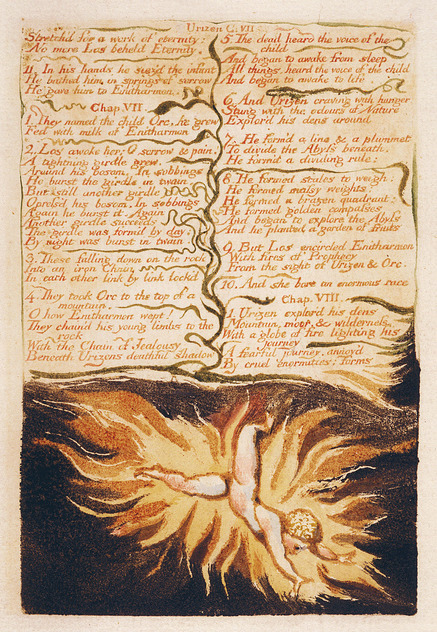
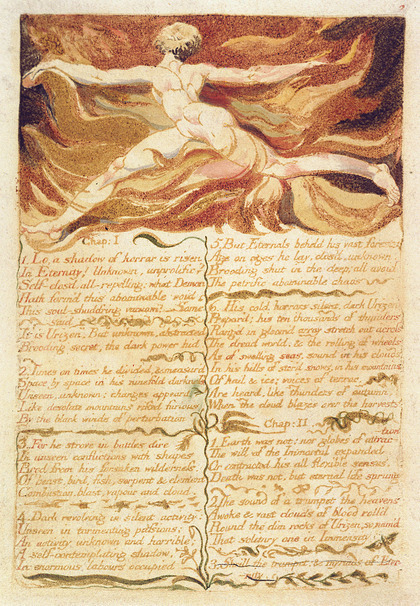
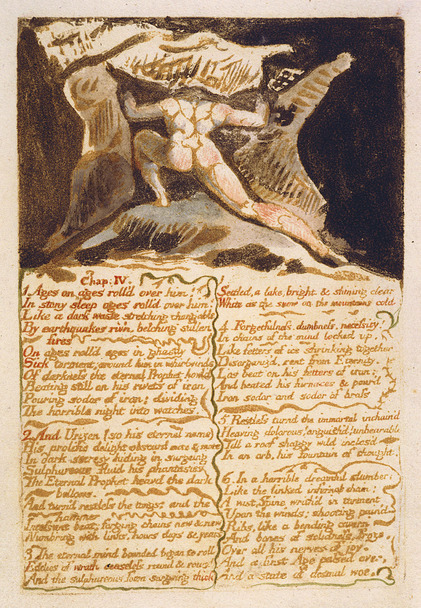
prints from “the first book of urizen” by william blake, 1794 (william blake archive)
#william blake#the first book of urizen#the book of urizen#(it used both titles over time but the 1794 edition was the first book of urizen)#book history#print culture#romanticism#artist book#illuminated printing#relief etching#art#art history#poetry#poetry history#mine#highly encourage anyone who sees this to go down a william blake rabbithole
4 notes
·
View notes
Text
I know the whole "deadbeat dad" and "child support" are huge memes for Vergil, but hindsight for Vergil...
He never knew he was a dad.
He didn't know a possible one night stand resulted in Nero's conception. He was 18-19 years old and was long gone from Fortuna by the time Nero was born. He probably never even saw the mother pregnant before he left.
I genuinely believe if he knew of Nero's existence, he would've been a present father in his life. If he knew he accidentally got a woman pregnant, I feel like he would've stayed in Fortuna. Or he wouldn't have strayed far from Fortuna. The Temen Ni Gru may not have been raised, Nelo Angelo may have never existed, V and Urizen may have never existed, Vergil may have found a new purpose in life other than chasing after Sparda's power in vain.
I don't think he would've changed personality wise, but he may have not made as many stupid decisions as he did knowing he had a child looking up to him. He was impressed by Nero's power when he first fought him. Vergil's got over a decades worth of training behind him, and Nero was able to overpower him at such a young age. I like to imagine Vergil would've loved to train Nero himself. Nero is so powerful on his own, can you imagine if he was trained directly by a son of Sparda?
And even though Vergil didn't know about Nero for over 20 years, you can tell he cares about his son. It feels as if his attitude changed towards Nero after he found out Nero was his son. His baby. His child. While they'll still strangers, he left a book he's been very possessive of since childhood with him. As a reminder they have unsettled business. As a reminder he's coming back for him. Maybe to fight, maybe to talk, or a little bit of both.
But definitely a reminder he now knows he has a son waiting for him on the other side.


[cr: JYA & haloefn]
#I'm a firm believer vergil would've been a good dad#nero#vergil#dmc#devil may cry#dmc3#dmc4#dmc5#dadgil
2K notes
·
View notes
Text

One thing I like about DMC is the parallels they sneak in where at first you may not think it is...but the more you think about it...
Like the scene in 3 with Arkham is essentially Vergil's first big footsteps into hunting for his father's power years later after the tragedy he endured. He's looking for a way to grab that power, and here comes Arkham to begin to properly set him on the path that builds up the domino effect that THEN sets up the rest of the suffering he has to endure. From his clash with his twin, to his defeat, then his attempted clash with Mundus that leads into his enslavement and weakening that sets the stage for DMC5 with the birth of V and Urizen.
Then, in Visions of V, the climax has it where V embraces Urizen and encounters essentially the form of his fears and weakness as his younger self. Of course, V is met with immediate act of aggression through instinct of self defense by his younger manifestation but he still is prompted to not show his special book to return to him, but also remind him that 'Power alone is not enough'.
That line alone has me thinking like....wow. A complete opposite to the context of the moment with Arkham, where there's the talk about power and the desire for it. The fact that its basically himself on the other side of his own sword in VoV telling him that is, to me, such an interesting display of character growth. I don't know if that moment in VoV was meant to reference the Arkham convo in 3, but I like to believe it was. Its so alike, that it'd be weird if it wasn't to me.

Here's another cheeky one I like too, by the way.
The very night that Vergil reclaims Yamato and heads home to split himself into V and Urizen has a full moon. JUST like the very night when Vergil first defeated Dante that would eventually lead into the escalation of 3's plot and even having an ironic callback in 5 that would lead into Dante unlocking his Sin Devil Trigger.
One's a moment of victory over his twin brother, asserting his power. The other? A moment of reflection of losses that haunt him to this day, reminding him of the weakness he's desperately trying to chase away. The said desperation that peaks his desire for power and pushes him to believe abandoning his humanity is a benefit.
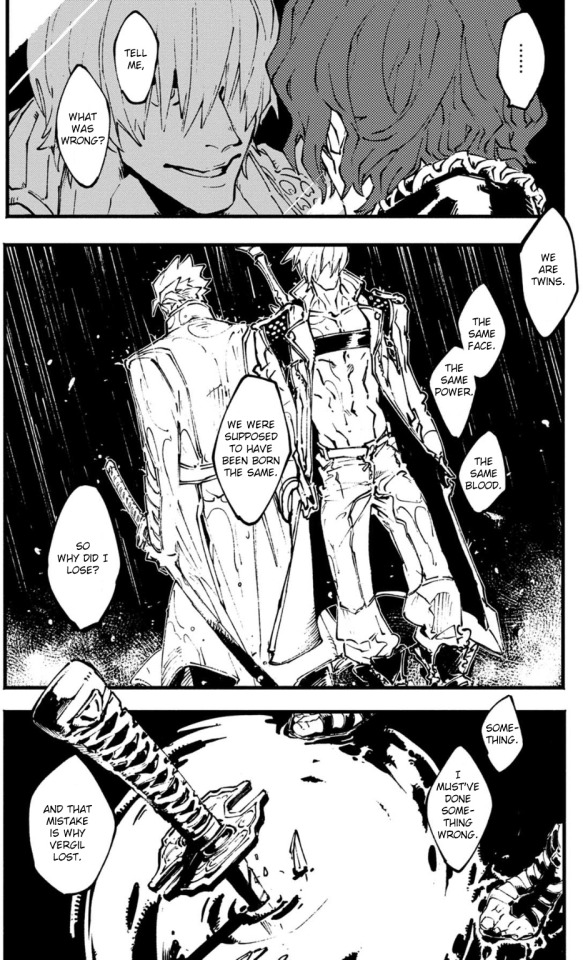


Of course, these thoughts still haunts him even as V (and especially Urizen, but I've mentioned that before) to the point where he reflects over it a few times. I often talk about these moment in VoV, but its just...man. One of the best things we got for DMC. A good addition for Vergil's character and essentially the icing ontop of the cake for 5 alongside the Before the Nightmare novel. There's several things it calls back to for Vergil's journey subtle or not. I hope we get more content like it in the future (maybe even have VoV localized officially), alongside games of course.
#devil may cry#dmc#leo's dmc analysis#I feel like I'm a nerd that should be shoved in the locker for how much I talk about VoV#tbf I would deserve it but it'd also be worth it#Graaaah I love Vergil as a character and the subtle refs they sneak in generally!!!#I'll prob talk more about the 3 manga and 1 prequel novel when the netflix series comes out#so bare with me abit longer-#meanwhile I'll have other small stuff between random yaps lmao
177 notes
·
View notes
Text
"Where once stood man and demon... Vergil was restored."
chills.
This whole scene is a lot. Upon finally being returned to himself, what's the first thing Vergil does? HE PICKS UP HIS GOD DAMN POETRY BOOK. He doesn't look at Dante and go "now I'm going to finally settle the score, brother! I need more power!" or anything like that. Hell, DANTE is the one who throws the first punch! I have to wonder if this scene might have gone differently if they'd tried being a bit more rational. When you think about it, Vergil has won. He's alive, which is always a plus, and he still has the power from the fruit of the Qliphoth. Outside of his fucked up relationship with Dante, Vergil kind of doesn't.... WANT anything anymore. He no longer has a motivation in the story. He could just go cut down the Qliphoth to settle the lingering threat to mankind and I dunno be on his way? They actually don't have any real REASON to fight anymore at this point.
But of course they're anything but rational in this moment. After decades of living alone, after decades of enslavement and living in an agonizing half life, all of a sudden these two brothers are facing each other once again. And they regress instantly. Suddenly they're two little boys eager to wack the shit out of each other with their toy swords, and nothing else in the world matters. Dante doesn't even remember WHY he wants to fight Vergil right now, he just charges him down. What would Vergil have done if Dante hadn't tried starting a fight with him? I don't even know. I don't think HE knows. He only runs off through the portal to force Dante to take a breather and recover so he can give him a real even fight when they do clash again. Neither of them even WANT anything right now. They're resigned to fighting each other because that's. Just. What they've ALWAYS done.
Vergil does display that the character growth he had as V has stuck. He shows his gratitude and appreciation to Nero (who is INCREDIBLY confused right now). He PROBABLY remembers Dante telling Urizen the truth about how and why their mother died. All of Vergil's hangups have sort of been resolved. He knows he was loved, and that Eva died trying to protect him. He knows that those human traits that he used to view as weak, his eccentricities and passions, were important and he should cherish them just as much as his demonic powers. And he even has the power that allowed Mundus to become the king of the Underworld thanks to the fruit of the Qliphoth. Vergil is more complete and set up for happyness than he's ever been in his entire life, and it's just that lingering mixed up relationship he has with Dante that's holding him back. The one thing he lacks is the thing he doesn't know yet: that Nero is his son.
Nero has no idea what the fuck is even happening in this scene. He just stands there, looking back and forth between the other two. (The way Dante shouts at him to get out of his way when he's standing like three feet off to the side is hilarious). It's only after Vergil leaves and Dante starts leaving too that he remembers what he's supposed to be here for. He still wants revenge for having his arm ripped off, but MOSTLY he's just pissy that Dante is still treating him like a little kid and not acknowledging him as an equal combatant. He feels like Dante isn't taking him seriously, and he wants to prove himself and he thinks that by helping in the fight with Vergil he can do that. He thinks Dante is telling him to sit on the bench because he's looking down on him. Until finally Dante is pushed to the edge and has to spill the beans. All this time him calling Nero deadweight and telling him to let uncle Dante handle it was his attempt at protecting Nero. As he walks off saying "I can't let you kill your old man" that's still what he thinks he's doing.
What Dante doesn't realize is the revelation that Vergil is his father has changed EVERYTHING for Nero. His world is upsidedown. The paradigm has shifted. "Kill [his] old man"? Suddenly that is the FURTHEST THING from his mind. The thought of wanting to kill a blood related family member is INCOMPATIBLE with Nero's view of the world and of himself. Dante just dunked a bucket of ice cold water on his head and it's all he can do to come to terms with it, the desire to "take revenge for having his arm ripped off" has now evaporated as if it never even existed. Dante doesn't realize how Nero is feeling right now, because Dante thinks that Nero's view of family is the same as his own. He thinks Nero still just wants to go kill Vergil, ties that bind be damned. Because that's how Dante would feel if he were Nero. Trish and Lady make the same mistake too.
When Nero looks back and says "my father...?" He's not thinking "I have to kill my dad?" He's not thinking "where was he my whole life, I'm gonna kill that deadbeat!" He's thinking something else entirely. And nobody else understands. Nobody else CAN understand. Except for one person.
#dmc#devil may cry#devil may cry 5#foxeh plays devil may cry#nero sparda#nero#dmc nero#dmc dante#dmc vergil#vergil#dante#dante sparda#vergil sparda
60 notes
·
View notes
Text
So, this is like my first post but...
I just found out today that in dmc 5 v and urizen is vergil but separated.
Buttttt I was on Google earlier looking at the different poems/books that William Blake wrote cause well it's Canon that vergil reads his work
And one of Blake's works caught my attention
"The book of urizen"
And I was fucking shocked cause I don't know if anyone knew this or not but it's so cool that "v" vergils human half gave the name "urizen" to vergils demon half cause like im not necessarily new to dmc or an old gen to it im kinda the inbetween.
But anyway I just thought that was really cool and just wanted to make my first post about that.
(Would appreciate some corrections or any comments about this cause im in the dmc rabbit hole rn lol)
25 notes
·
View notes
Note
Hello! I have an idea for a (fluff / angsty?) request with Vergil - might be a little long sorry abt that
Basically after dmc5 he returns from hell with Dante and he has some loose ends to tie, one of them being mending his relationship with his s/o (aka neros mother). I was thinking maybe she worked for Dante as a devil hunter and V gives subtle hints of his true self but she didn't catch on until the big reveal. I dunno if that'll be good enough so feel feel free to add on whatever!
Thanks for reading all this if you do and have a nice day :)
Nah, nah, it's fine. Have a MOTIVATED day yourself!
Lots of catching up to do (Vergil x Fem!Reader angst/fluff)
You knew something was odd about this "V" fellow the moment he set foot through Devil May Cry's door. You'd been visiting your employer and friend Dante at the time, and happened to be present when the mysterious man showed up, cane and book in hand. You recognized that book; it was an old copy of William Blake's poetry that Vergil used to tote around, occasionally reading excerpts from it during his downtime.
Ah, Vergil. It'd been a while since you heard that name, or even seen the man, for that matter. The last time you had an interaction with him was years ago on a moonlit eve as you said goodbye to him for what you thought was the last time, right before he departed in his quest for power, and just a month before you discovered you were pregnant with your son Nero.
You were lost in thought for a while, barely even noticing the fact that V was staring you straight in the eyes, a smug smirk on his face, as if he knew something you didn't. You wanted to question him, but knew it'd be better to keep your mouth shut. You, Dante, and the rest of Devil May Cry's staff had a mission to complete.
Imagine your surprise when V insisted on you accompanying him and Nero into the Qliphoth, only giving you a vague, meaningless reason you didn't care to remember. It seemed he just wanted you nearby, even though your skills would be better put to use on the front lines, with Dante, Trish, and Lady.
After the first assault failed and mostly everyone crawled back home, defeated, you found yourself being followed by a tall, skinny, emo-looking man whose name was one letter long. Why he was still following you around despite the separation of the devil hunting team made no sense, but since he was somewhat friendly and didn't seem to have ill intentions, you let him stick around.
Some time passed while you tended to your son, whose arm had been ripped off not too long ago, and over time, you two had to charge back into the fray to save the city from more demon attacks. V disappeared for a while, but you didn't mind, since your focus was on helping and protecting your son. Nero always came first in your mind, because he was the only piece of Vergil you had left.
V eventually returned, in terrible condition, bringing with him Dante, who had been found half buried and covered in blood in a hole near his shambling house. Though none of you but V knew it, the moment all four of you stood together was one of the rare moments when the whole Sparda family was all in one place.
Then V scampered off, trying to find Urizen before the others did, and while an inner instant compelled you to follow him, you decided to go with your son, because again, Nero always came first. You ended up running into V once again, except now he had all the structural integrity of a soggy marshmallow, and needed to be carried between the two of you to his final destination, where Dante was duking it out with Urizen.
After the beast had fallen, V broke free of yours and Nero's hold and scrambled on top of it, which was when he jammed his cane right through its chest and exploded, bringing forth an individual you never thought you'd see again: The father of your son and the love of your life, Vergil.
The hope and joy you felt as you watched him materialize was nothing short of incredible; now you saw why V was the way he was, why it was so soothing to be around him, and why he chose to stay with you. V was Vergil. In a way, he'd been with you all along.
You thought that this would be the end of everything, that now, after so many years, you all could go home and be a happy family. You couldn't have been more wrong, for not one minute after finally returning, Vergil went off to the top of the Qliphoth to fight with Dante, Nero following after them, with you being the last to catch up. You arrived just in time to watch them dive off the demonic tree into the underworld, and felt all the happiness drain out of you in an instant.
There he goes, again, this time taking Dante with him. Oh well, you decided. You'll have to devote all your attention to your darling son, who surely needs more comfort than he's letting on.
Several months passed with you and Nero dedicating all your attention to exterminating demons that lingered in the land, feeling sad over the departure of the Sparda twins, but unlike most, you two vented your stress and worry out on demons, by killing them. You two were doing somewhat fine; Nero was still struggling to cope with the fact that Vergil was his father and you never told him, and you were still heartbroken. Then, out of absolutely nowhere, Vergil knocked on the front door right as you were getting ready for bed.
"Vergil?" You gasped as you opened the door.
"Yes," Vergil replied, expression as grim and stoic as ever. "I...I'm home, Y/N."
"You came back from Hell...but how? And where's Dante?" You asked, not entirely sure if this was reality or you were dreaming again.
"He is at his shop," Vergi, replied, sternly. "Do not concern yourself with him. Where is our son?"
"He's upstairs, why?" You said slowly, wondering if he had ill intentions at heart.
"We have a lot of catching up to do," Vergil answered, a warm smile flitting across his face for just a second. "All three of us."
"That we do," You agreed, chuckling as you took the half devil by the arm and dragged him into your house. "Nero! Come down and meet your dad!"
#Dmc#Dmc5#devil may cry 5#devil may cry#dmc vergil#vergil dmc#vergil devil may cry#vergil sparta#devil may cry vergil#vergil x reader#dmc vergil x reader#dmc5 vergil#dmc5 vergil x reader#requested#thanks for requesting#icycoldninja writes#fanfic#angst#fluff#light fluff#angst fanfic#fluff fanfic#angst with happy ending#vergil#vergil x you#vergil x nero's mother#vergil x reader fanfic
89 notes
·
View notes
Text
Devil May Cry Netflix Opening Credits Partial Deepdive/Shouting Part 1
AUUUUUUGH I gotta do a lot of work today and return a library book but GOSH I wanna shout about it.
FIRST THINGS FIRST! Love the style of the intro, Love a color block, love a dot tone. SECOND! Dang what a opening credit scene. I feel like it really shows a lot about how the creators do love the series.
I am going to ramble and talk about the big scenes that made me excited so--if you want to see that read more below xD Future Flockoff Note: This is Part 1 I hit the image limit orz
Part 2: Link
First and foremost, I do not necessarily think that this intro is showing things that will turn up in the anime. I think above all at this time, I am going to focus on this being a love letter to the series. Though MAN it could so easily add fuel to the "Anime is Nero has to disguise himself as Dante for Reasons" Joke Theory/Fun AU. I swear if this actually happens I will both be delighted and also insufferable from how much I will shout about it.
Edit: Having done a scene by scene on accident (whoops), it does actually look like a lot of the scenes will be actively relevant to the series than I initially thought. Which does have me wonder--how does the Order of the Sword play into this?

Even with this shot, not only doe sit prominently feature Rebellion, Alastor (MY BOY! :D), Force Edge, and Red Queen (RED QUUUEEEEN), but there is also Agni and Rudra, Goddamn Vendetta, Merciless, AND Lucia's Klyamoor from Devil May Cry 2! (Honestly there are probably more in the far background but--It is so fun to see those guys be put out there so prominently <3 <3)
Also the like--The way they are teasing Vergil in this is so fun. We love the Rebellion flickering in and out of being the Yamato.

Bby girl you look beautiful.
But also the changes that happen with each of the effects-the Hell landscape turning into a city is just fun :D
But it also just looks SO COO! Like Aaaaugh I love color blocking so much.

And excuse me is is this Cavaliere Angelo?


Like the eyes, face shape and chest has similar design shapes and language to Cavaliere.
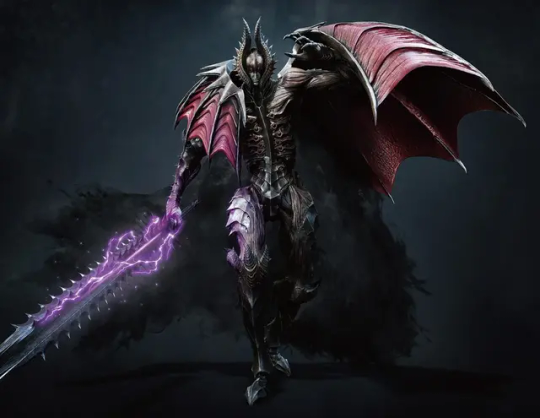
But--A part of me is hoping. That perhaps maybe its Alastor. We have very little that is considered canon for non-sword Alastor and I could see Alastor and Cavaliere having similarities given that they are both electricity based. Furthermore, the idea that Urizen modeled Cavaliere after Alastor somewhat. But of course--that is just me doing BIG wishing cause I love that sword so much. I want Dante and Alastor to have the most one sided situationship.

Classic DMC times, City getting invaded with demons. Love that the Rabbit is the "Warning!" sign. I'll probably be squinting at the shape in the sky for a bit. Though Currently-No idea who the heck that is.
I thought maybe it could be a stylized Qliphoth--but it also could be a guy.

Kind of guy shaped in this one.

Great illustration, good Pizza. But also more importantly-Ebony and Ivory. :)
Also WOW

So Many Strawberry Sundaes for Dante.

And they go straight into our good friend,

Jackpot :)

"🍕 :>"

WE LOVE TO SEE LADY PROMINENTLY FEATURED IN THE CREDITS. Also Lmao that she appears at the "Hey Ladies" part of the intro xD

Lady's gear! Considering what was done with the Netflix Adaptation of Castlevania and Sypha--I wouldn't be surprised if they go more indepth about Lady's Devil Hunting equipment.

THIS GUY THOUGH--Not sure who this guy is. I don't think its Arkham. It could be a entirely new character. But if this is a intro featuring major players, and he is a previously established character my wild card guess would be Gilver. Big thing to note is that he comes in to the part of the song that goes "Guys who don't give a Fuck" and his sub animation is a zoom in on his shades--where you can see a Demon Flying towards him.

His tools of the trade are shown as two monitors with the logo for Darkcom in the center (which I don't recognize Darkcom from the series--Only know the name from a future shot), and-- Okay I am bad at identifying guns but I can at least say that it isn't the shotgun that Gilver had in the light novel. I think

Followed with this

Angry demon Skull logo yaaaaay! But also-Two DNA diagrams behind it. Which I think could hint at Gilver.

We love to see the Human World and Demon World paralleling Dante and Vergil :>
But time for the big shouty things...

THE BIG ASSHOLE HIMSELF! LOOK AT THAT! MUNDUS YOU LOOK SO GOOD!

ORDER OF THE SWORD, HOW ARE YOU DOING!?

RABBIT WHO MAY BE ARKHAM WITH A SWORD RIDING A BIG DEMON, WAHOOOOOO! Also behind him you can see a rabbit fighting animation happening so that will be fun :D

Go you funky lil rabbit man. Get closure for your arc. 🫡

Also LADY YOU LOOK SO GOOOD!!! Aaah she is so cool and beautiful <3

I spent too long going scene by scene I forgot that they had the two halves of the amulet be the human realm and demon realm whoops lmao.
But more than that--LETS GO SEE A VERY SPECIAL BOOOOY

Admittedly-not fully sure that this is Nelo Angelo. Could not be Nelo Angelo. BUT OOOOH I want to believe. If it is Nelo Angelo, looking fantastic buddy. Love to see you even if you make me so sad.

We also have a shot of Rabbits Crew--There we see the Not-Cavaliere-But-Maybe-Alastor, Some vines on the one toward the left which makes me want to say a Echidna like, and got no thoughts towards the other 3 yet.
These are unrelated I just like these two frames that I accidentally paused on.


Genuinely love to see it actually.
#devil may cry#Devil May Cry Anime#Devil May Cry Netflix#Devil May Cry Dante#devil may cry text post#Text post
16 notes
·
View notes
Text
I see a lot of people (including myself) tend to think Nero was accidental. That he wasn't planned on either Vergil's part or Nero's mom's part, he was just a byproduct of circumstances or whatever and thats why he was abandoned by his mother in the orphanage.
But what if he wasnt accidental at all?
What got me thinking about this was Vergil's line in his ending in DMC4SE; "Soon they shall know this devil's power. The power of a son of sparda".
Theres no way he would've been talking about Dante. By that point in time he likely assumed Dante was either dead or long gone off on his own thing, and he probably wouldn't be meaning himself either because he's leaving fortuna in this cutscene. That leaves one option: Nero.
Vergil wanted to follow in his father's footsteps. Thats why he was in Fortuna in the first place, to learn more about Sparda and the life he lived, what he did and accomplished, etc. Sparda had two sons, and you probably know where im going with this by now.
Maybe thats why Vergil did too. He wanted to follow in his dad's footsteps, and being the misguided and naive teenager he was, he couldve thought that was the next step in his journey. (Then promptly realized he either didnt want or wasnt ready for a son and fucked off)
"Soon they shall know this devil's power. The power of a son of sparda".
Not just any son; His son.
Another thing that makes me lean into this theory is how he reacted to the revelation of Nero being his son from Dante in DMC5. He didnt sound all that surprised, if you ask me.
His reaction comes across to me as if he knew of this "son" ready, but of course since he had never met Nero in his life, he didnt know who this son was. He knew he had a son, he just didnt know it was Nero specifically;
Nero, who he'd just spent basically an entire game relying on and trusting his fate to (and dante ig but thats not the focus here) as V, Nero who he ripped the arm off of to regain Yamato unknowing of who he really was - only that he had Yamato - and Nero who he'd just abandoned yet again to fuck off to the top of the Qliphoth where he intended to meet one of two fates to his battle with Dante; death, or survival, and neither of those involved his son at all.
And now that he knows who his son is, now that he's met and has known his son for a while now actually, he's left to deal with the guilt of abandoning him and leaving him on his own for the last 25(ish) years. For hurting him, mutilating him, damn near fucking killing him as Urizen. This son who he never had any intention of knowing, ever, not even once.
This son who he now has to learn to love, or at least accept as a part of him and his life, whether Nero himself accepts it back or not.
(And yknow, i think things will work out fine for them if capcom ever decides to make another entry into the timeline. Nero seemed pretty set on keeping his father alive after all, why would he bother if he didn't care? And Vergil seems to be making an effort - albeit an awkward one but its still an effort nonetheless - to be present in Nero's life at least to some degree judging off that main menu screen of them sitting together in the van in tense silence.
And he does care about Nero, way more than he lets on. Gifting his book to Nero is clean proof of it, that book which represents his heart. His love, his soul, his being.
So yeah. I think they’ll turn out okay.)
#idk thats my take on Nero's conception#i was replaying dmc 4 and hearing that line by vergil got my brain gears turning#i think if they shared a heart to heart over some hot chocolate and a pillow fort all their problems would be solved#devil may cry#dmc#nero devil may cry#vergil devil may cry#headcanons#theory#its just a theory#a GAME theor--
30 notes
·
View notes
Note
Forgetting / Vergil
WIP Folder Game: make a new post with the names of all the files in your WIP folder, regardless of how non-descriptive or ridiculous. [...] People can send you an ask with the title that most intrigues them, then post a little snippet or tell them something about it! (click here to see my list)
So this one is more of a concept than a real fic! I like to headcanon that post-DMC5 Vergil is actually missing a ton of memories, both because of what Mundus did to him and potentially because he lost some when he split himself with the Yamato, and this fic is my way of exploring that.
I like to headcanon that Mundus attempted to destroy Vergil's spirit/consciousness in order to get the perfect/subservient knight, and that part of that process was essentially wiping the slate clean by getting rid of Vergil's memories. Some he very specifically targeted, others were (conveniently? inadvertently?) destroyed as part of the Angelo process. As for the Yamato thing, Griffon, Shadow, Nightmare, and Phantom in the Visions of V Mange seem to be made of Vergil's unpleasant memories. In separating them from himself, Vergil at least temporarily freed Urizen of the burden of those memories. Would destroying Griffon and co. destroy those memories entirely (like what V did to Phantom in VoV, and Dante did to the trio in DMC5 M18)? Or would they go back to Vergil once they were all dead? I haven't quite decided. I think it would be interesting if Vergil carved them out with the intent of getting rid of them, but phantoms (hehe) of the memories remained somehow. The impulse is there even if the tangible memory is not.
Anyway! This fic is basically supposed to explore the idea of Vergil being upset by how many mundane memories of his are missing. Sure he's been freed of Mundus in that he's no longer subservient to Mundus, but he still feels shackled in a way because the effect of Mundus' actions (Vergil's loss of memories) remains.
While Vergil isn't as clingy to his humanity as Dante is, I think it would still disturb him to know he's incomplete/"broken." He's been altered in a way he cannot fix. Not even the Qliphoth could do it. So, this fic would be an exploration of mental/emotional wounds, perhaps made worse by the fact that no physical wound remains. He can't look at something and go 'yes, something happened here' because there's nothing to look at. He can't get visual confirmation of his experiences. It's all in his head and there's no one who'd know but him.
He also doesn't know just how much he's lost, because he'd need to know he had it in the first place to know it's gone, and this is also a particularly painful topic. Is it that he never knew XYZ, or that that knowledge has been taken from him? How many times will he accidentally/randomly upset himself because he runs into knowledge/memories he should have but doesn't? How many times will the wound be reopened? How is he to avoid reopening the wound when he does not know its depth, its length? He can't. And it frustrates him immensely. He wants to move on, but it's hard when you never know what will set you off and have no way of regaining what you've lost. Sure, Dante can tell Vergil about some of the things that happened in their shared childhood, but there's an entire decade Dante missed before their encounter at eighteen, not to mention a decade of haze afterward that Vergil may or may not be interested in recalling (I think he'd be less interested in remembering that because he did cut out those memories with his humanity as a source of weakness, but I'd like to think post-DMC5/V Vergil would be more interested in that than he was at the start of the game).
Thank you for sending the ask! I haven't looked at this fic in a few months and this makes me want to get back to it. For fun, I'll put the rest of the outline below the cut.
Dante: “That book steal your favorite teabags or something?”
Vergil's head snapped up to look at the source.
Vergil goes on about how he knows he read this series. He knows it. Something in the book was important to him, changed his outlook on…something. Life, maybe? He doesn't know. He doesn't know because even a hundred pages in, the words are completely unfamiliar. There's not even a fragment, not even a wisp of memory there. No hint of recognition. And he knows that people forget things, sometimes, but this isn't simple forgetting. The memory has been carved from his mind. Broken and siphoned out and thrown away, never to be used again. It is gone.
And he isn't sure how to feel about that. Why would Mundus eliminate such a memory? Was it because he was trying to completely erase Vergil? Was he targeting Vergil's more “human” memories? Was he trying to destroy each and every thing Vergil ever enjoyed, to punish him?
Dante tells him it's okay. It's just a book. Vergil can read it again-
And Vergil snaps back that it's not just the book. He hadn't even realized he'd lost this memory until he came across the book in a pile of Dante's stuff in the back room. He hadn't known he'd lost it.
How much has he lost without realizing it? How much has been taken from him? How much will never, ever come back, because it's been scraped so clean there's no residue to reform it from?
The majority of his life in the human world wasn't a pleasant one, but it was his. It's what made him into the man he is. If it didn't, then it meant Mundus did. And he didn't want to be that man. He wanted to be the man he himself formed, through the things he chose to do and the books he chose to read. And if he doesn't have that then…
#erurandomness#eruanswers#eruasks#ty again! it really s fun to look at my old wips#i should try to get back to some of them#i'm so caught up in my longfics that the shorter ones have fallen by the wayside#dmc
9 notes
·
View notes
Text
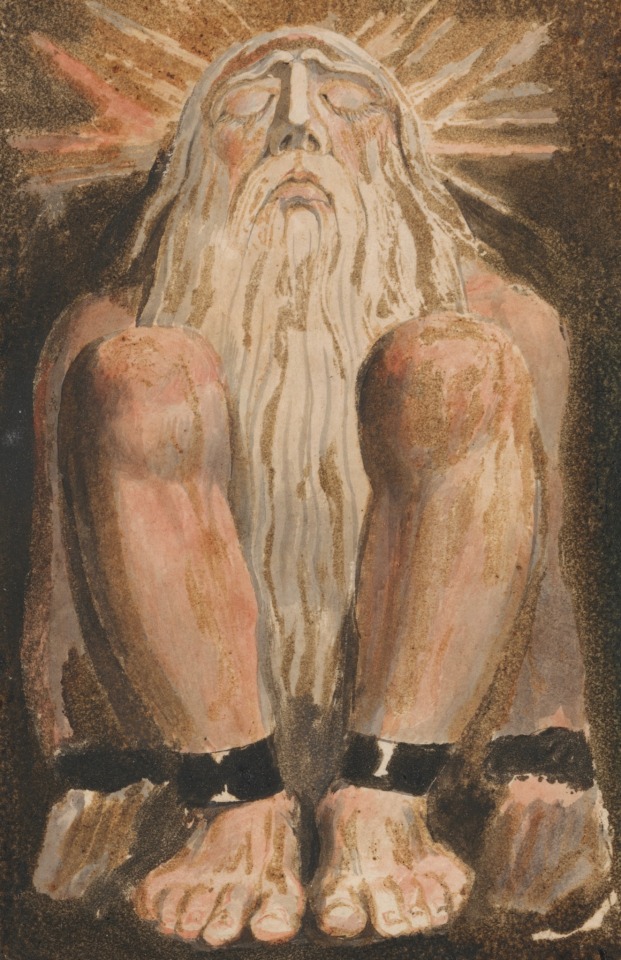
‘The First Book of Urizen, Plate 3 (Bentley 22)’ by William Blake, c. 1794.
#william blake#vintage art#classic art#art#art history#old art#painting#art details#vintage#moody art#illustration#symbolism
83 notes
·
View notes
Text
Paradox of the Thirteenth, or "There's a surprising amount of Faction Paradox in Series 11-13"
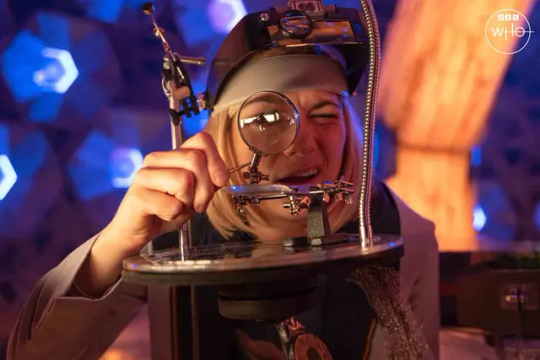
Despite not being many fan's top choice, the Thirteenth Doctor's era shared concepts with the Faction Paradox series surprisingly often. Some of these were explicit, such as The Paradox Moon featuring Siblings Same and Different (although these Siblings' Faction is otherwise unrelated to the FP Faction, as of 2023), whilst others are simply similarities in creative choices, again varying in how obvious they are, from the "Ashad" (Series 12 - The Timeless Children) resembling FP's technosapiens, to Time Lords "binding" time in Once, Upon Time (part of Series 13/Flux)
So, here I will attempt to list every possible connection between the Thirteenth Doctor/Chris Chibnal's era of Doctor Who and the Faction Paradox mythology
Firstly, an explanation as to why this is all happening...
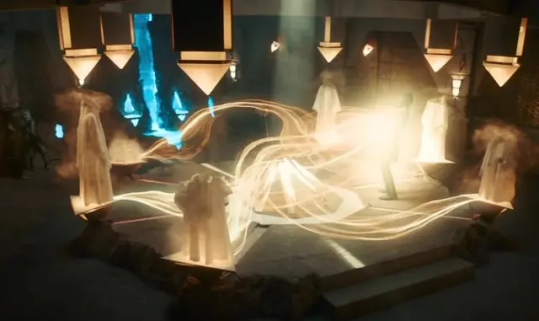
Explanation as to why the Thirteen Doctor is meeting Faction Paradox-esque entities.
The War has been ended for a long time, and the Great Houses have finally, actually, fallen (see The Timeless Children) leaving no one to hold up their imposed metastructure of history. Why didn't anyone invade in Series 1-7, before the Time Lords returned?, you ask. Well, it's not because The Day of the Doctor is a bootstrap, as I don't believe in perfect bootstraps, but rather because well... They did. During Series 1, the Reapers arrived, explicitly due to the lack of Time Lords (Father's Day), and so did a lone Dalek (Dalek), and finally the original Dalek Emperor's last Time War fleet (The Parting of the Ways). Then in Series 2, the Cult of Skaro arrived (Army of Ghosts/Doomsday), followed by Davros (The Stolen Earth/Journey's End)- who along with the Supreme Dalek, somehow survived the Crucible's fall (The Magician's Apprentice/The Witch's Familiar)- and then the New Dalek Paradigm emerged, from survivors of the War (Victory of the Daleks). All this interference from War-time participants is what's preventing pre-Anchoring entities entering the Third Universe, as it echoes the status quo which was so hostile to their very existence.
Oh, and "Dvapara Yuga" means "the Dark Times, as understood to not be an early period of universal history, but rather the state of history metatemporally predating Rassilon's anchoring of the thread"
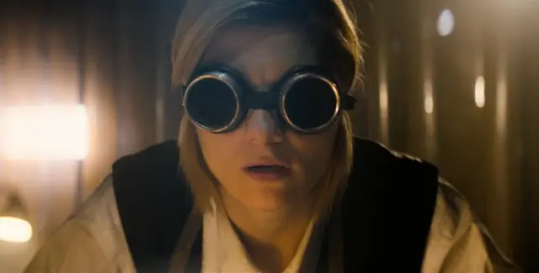
She is born out of an interaction with a past Doctor (Twice Upon a Time) - if it wasn't for acausal (and unintentionally) intervention of the First Doctor, the Thirteenth Doctor never would have existed. This is a bit of a stretch, as interference forwards in a timeline is much less paradoxical than the reverse, but this is her first appearance so...
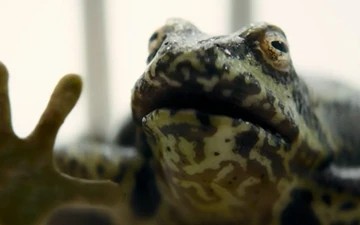
The Solitract, from It Takes You Away, is an intelligent & conscious universe, exiled from the main universe in order to allow for it's creation. "Creation" here probably refers to Event One/The Big Bang, but, if one is on the train of "the universe before the Anchoring of the Thread didn't have a beginning, and the Big Bang was retroactively added by Urizen [Rassilon]", then this is very easily re-interpreted as a mention of the early Sun Builders (a.k.a Time Lords) cleaning up their area of spacetime in preparation for imposing rationality on it. To be even more bold, I may suggest that this isn't a universe at all, but instead an intercreational, a class of being first mentioned in The Book of the War, although one type was first mentioned in the BBC Eighth Doctor Adventures novel The Taking of Planet 5, as a "Swimmer". I propose that the Solitract is not a Swimmer, or a Leviathan, but rather a smaller intercreational, perhaps growing out of the Third Universe (the main DW/FP universe), before being banished by the Great Houses. See Explanation as to why the Thirteen Doctor is meeting Faction Paradox-esque entities at the top of this post.
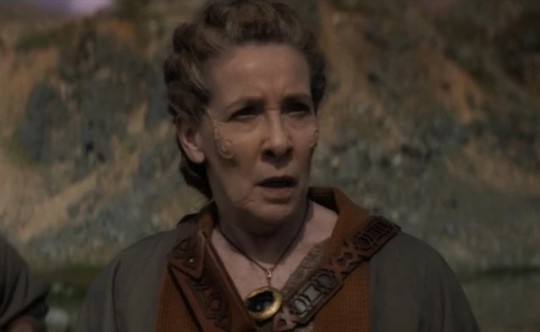
The Ux, from The Battle of Ranskoor Av Kolos, are clearly some gods from the Dvapara Yuga.
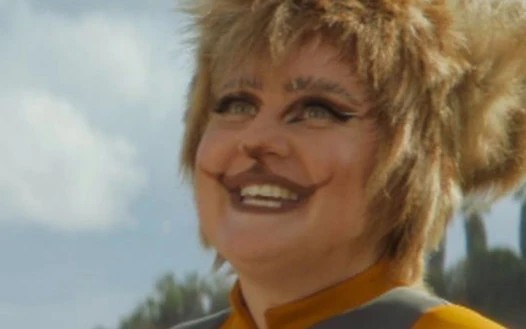
Orphan 55 features a future version of Earth which deviates heavily from most other depictions of it. Speculatively, this means the Thirteenth Doctor travelled to an aberrant timeline, or that the Ghost Point has somehow worsened since the degradation of the Great Houses's imposed metastructure, rather than healing.
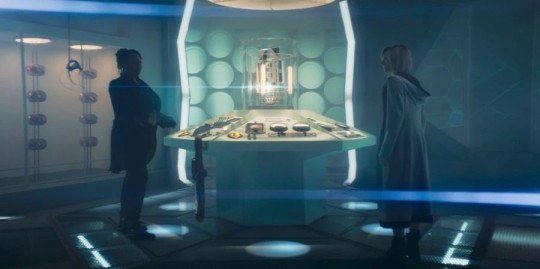
During Fugitive of the Judoon, the Doctor interacts with Gallifrey's distant past. I can't really explain this even by the standard explanation at the top of this post. However, one thing interesting to note is that the ancient Time Lord "Gat" considered "Mutter's Spiral" to be a "tiny galaxy". This is notable because Gallifrey is basically always said to be in the centre of Mutter's Spiral - that is, the Milky Way - and naming a galaxy as "tiny" kind of implies that you aren't from it. Maybe Gallifrey wasn't always in Mutter's Spiral, and got moved? Or maybe Gat and the Division come from some alternative Gallifrey? I don't know, just interesting to note.
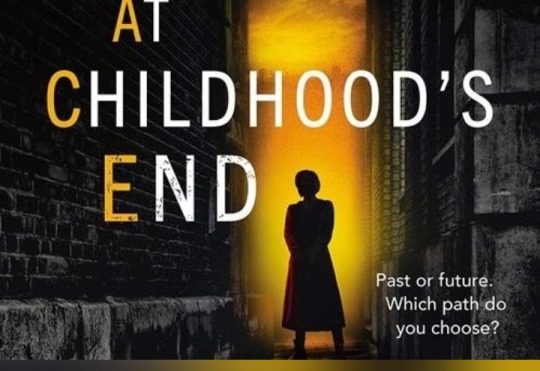
The novel At Childhood's End (written by Sophie Aldred, actor for Ace) featured Ace meeting the Thirteenth Doctor, and descriptions of the former's fractured timelines. Notably, the next time Ace and the Doctor met (in The Power of the Doctor), neither one of them mentioned this, almost as if the timeline in which it happened had fractured...
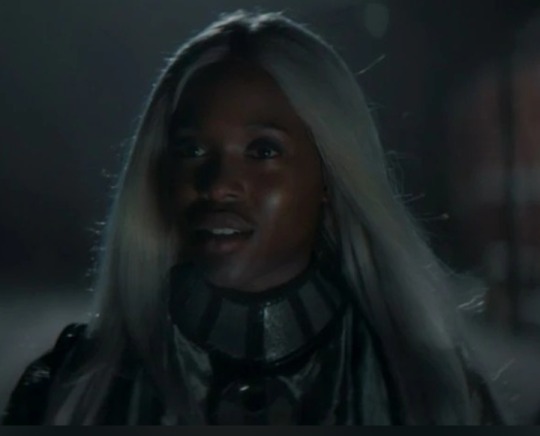
Rakaya and Zellin from Can You Hear Me? are clearly some kind of pre-anchoring gods like the Ux. In Time Lord Victorious short story The Guide to the Dark Times, it was confirmed that they were, specifically, Eternals (not the MCU kind), and another Time Lord Victorious text, a novel called The Knight, the Fool, and the Dead, claimed that Eternals were among the other inhabitants of the Dark Times, the "Old Ones". Interestingly, multiple Eternals do indeed appear in the "classic" series of Doctor Who, implying that the Anchoring did not fully remove them, but as they didn't appear in NuWho until now, I feel safe in speculating that the War somehow barred them from it - perhaps they'd joined the conflict, on the side of both the Time Lords, Daleks, the Enemy, and others, "helping out" wherever it benefited them?
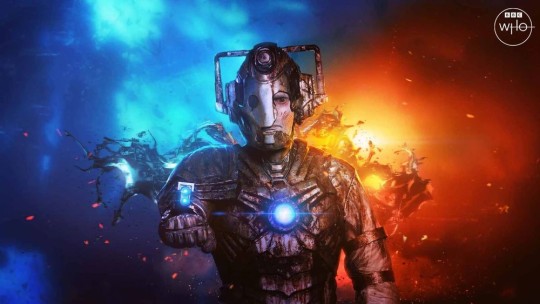
Ashad, first appearing in The Haunting of Villo Diodati, and then in the following serial Ascension of the Cybermen/The Timeless Children, is an "emotional Cyberman". Any readers of Faction Paradox could immediately draw the connection between this and Faction Paradox's "technosapiens", named as such partially to avoid infringing on the BBC's trademark, but also because The Book of the War showed that many sects of posthumanity had become cyborgs, but many were not emotionless and evil like the Cybermen.
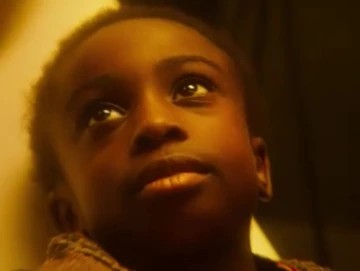
The Timeless Child, first appearing in The Timeless Children, is vaguely reminiscent of the idea hinted upon in The Book of the War that the Great Houses stole the power of regeneration from another species, in The Book of the War being the Great Vampires, and in The Timeless Children being the titular Timeless Child. This note of continuity was expanded upon by the writer @aristidetwain in his short story Out of the Box introduced the "Child-That-Was-Taken", intended to be a member of the Yssgaroth species, and to be the Timeless Child itself. Additionally, this Child was the motivator for the Great Vampires' war with the Great Houses, the Eternal War (a.k.a First War in Heaven).
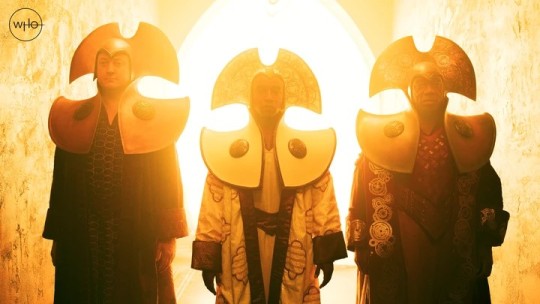
In The Timeless Children, Tecteun is shown alongside Rassilon and Omega. Previously, the figure alongside Rassilon and Omega was the Other, a version of the Doctor from before he was the Doctor. My personal fix for this, which I admittedly took from @/aristidetwain, is that there were many Others, assisting Rassilon and Omega at different points in time. Other Others may be the human Dr. Who from the novel Human Nature, the Eleventh Doctor "Cheesemaker" (The Lost Dimension), Osiris (in his car future), and the Sixth Doctor (The Scrolls of Rassilon)
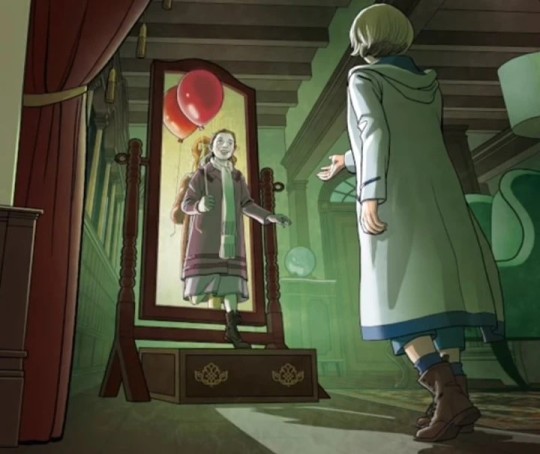
In Shadow in the Mirror, the Thirteenth Doctor released Aphasia / Daughter of Mine from her mirror of entrapment, despite the fact that Aphasia mentioned a "ginger haired doctor" who "believed himself to be the last" (likely Muldwych/Merlin), meaning that the Doctor had been interacting with Aphasia out-of-order, which is... Reasonably dangerous.
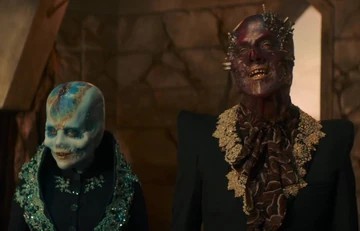
Throughout Flux, the villains "Swarm" and "Azure" attempt to remove the Mouri from the planet Time, effectively de-anchoring the thread. They're method, strangely, is to try to destroy the entire universe using "the flux".
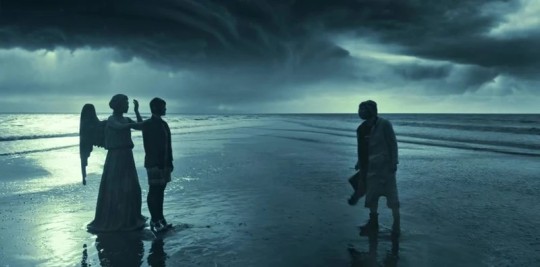
Village of the Angels features the first instance of Weeping Angels being shown to posses proper intelligence, as they ally themselves with Tecteun, presumably in exchange for something, and even more interestingly, they have a rogue member, suggesting power structures in their ranks. This isn't particularly Faction Paradox -related, but it feels like it is, and I hope Faction Paradox writers use Weeping Angel - analogues to continue to explore this.
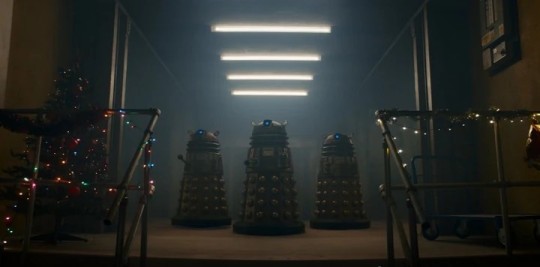
Eve of the Daleks features the Doctor "resetting" the TARDIS, causing a localised time loop. However, perhaps more notably, the Daleks which appear in this episode are "Dalek Executioners", which make their debut in Time Lord Victorious.
The Power of the Doctor won't be mentioned here, perhaps I'll grant it a full post going over all of its batshit-insanity (affectionate?) some other time.
This post was made after I saw @familyparadox remark at the high amount of Faction/Thirteen content
#faction paradox#doctor who#dweu#thirteenth doctor#jodie whittaker#chris chibnall#ashad the lone cyberman#eternals#long post
70 notes
·
View notes
Text
Ship of Theseus
Post DMC5, OC/Vergil and implied past OC/V. 624 words. Work in progress. Inspiration struck and I wrote out the start of a fic going over the period of time between the brothers returning from hell and settling back into a sense of normalcy, and what that means for the relationship between newest employee Arcade Rockwell and the man formerly known to him as V.
“The ship wherein Theseus and the youth of Athens returned from Crete had thirty oars, and was preserved by the Athenians down even to the time of Demetrius Phalereus, for they took away the old planks as they decayed, putting in new and stronger timber in their places, in so much that this ship became a standing example among the philosophers, for the logical question of things that grow; one side holding that the ship remained the same, and the other contending that it was not the same.” — Plutarch, Theseus
Two months, three weeks, and five days.
It had been two months, three weeks, and five days since Dante and Vergil returned from Hell after severing the portal to the demon world and arrived unceremoniously on the doorstep of Devil May Cry. Longer still had been the wait between them leaving and reappearing, which had taken six months, three weeks, and eighteen days. In their absence, Arcade had been assisting Morrison in day-to-day affairs within the office alongside Trish and Lady, as well as mailing correspondence to the branch back in Fortuna as well as his parents, who had been worried sick.
It was right before the holidays when the two brothers made their unexpected return. An invitation had been extended to Nero, Nico, and Kyrie to attend a dinner party at the main branch’s office as a family. Kyrie was in the middle of shooing Nico out of the kitchen for smoking cigarettes in close proximity to the food when a knock at the door caught everyone’s attention, and in stumbled the two twin sons of Sparda, looking completely disheveled, covered in demon blood and god knows what else, and in desperate need of showers.
Dante had settled back in easily enough- Devil May Cry was his home, after all, and business resumed as usual, even if the withering of the Qliphoth tree meant marginally less demons had been tormenting Red Grave City- Which ordinarily would have been a good thing, but it meant less jobs for the devil hunters who relied on carnage to keep the lights on.
The upper floor of the office had been converted into guest bedrooms several months ago when Arcade was first hired on as a repairman and then an official devil hunter and requested use of the space. There were two rooms on that floor, one being his, and the other being currently occupied by Vergil.
In the rare moments Arcade was able to peer into the second bedroom, he noted how it remained eerily devoid of any personal belongings, consisting of only a bed, a wardrobe, and a nightstand, on which was placed the collection of poetry bound into a book that Vergil had requested back from Nero and had been holding onto ever since. If it wasn’t for that one item, it looked like nobody even lived in that room.
For those two months, three weeks, and five days, Arcade had been struggling to approach Vergil. In his mind, he was constantly trying to rationalize why this man was seemingly so different from V, the person he had known prior and fell in love with. It felt as if Vergil was an entirely new person and V had been replaced completely- But he knew that couldn’t be true. Hell, he saw firsthand V reunite his dying body with Urizen after carrying the man to the deepest depths of the Qliphoth tree with Nero, he saw V become Vergil.
But if this was fundamentally the same person, why did he feel like a stranger had taken up residence in the room next door? Who was this man he let into his heart, and when did he plan on asking if he still felt the same?
#dmc#devil may cry#vergil sparda#vergil dmc#vergil x oc#v x oc#oc x canon#dmc oc#dmc v#chat idk how you tag this sort of thing#anyways hello dmc community here's more of my bullshit
4 notes
·
View notes
Text
I've woken up on this day with a few quick thoughts on this scene from DMC5
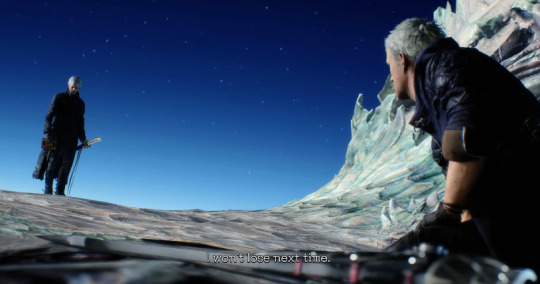
Some things ppl (maybe myself in the past) have noticed and stated probably before but I'll throw my thoughts in anyway.
So, after Dante and Vergil knock back Nero, to keep him from following after him and establishing him as the protector of the human world while they go on to the demon world to cut down the Qliphoth tree. You can see Vergil's gaze linger on Nero for a good moment.
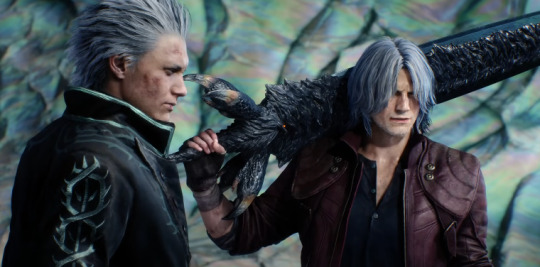
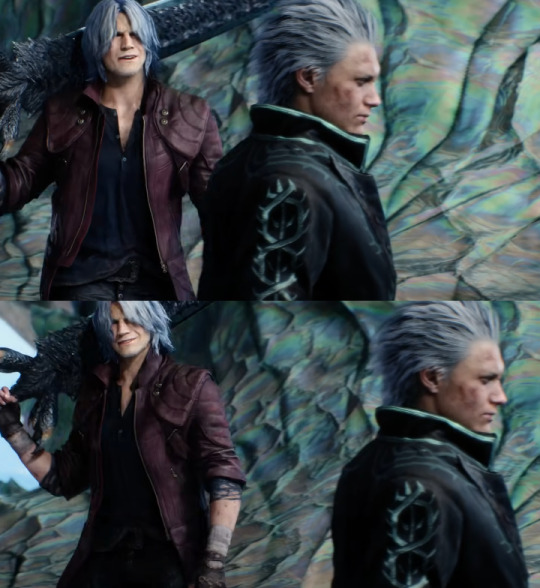
And I mean for a hot minute, too. He's gazing at the one he just found out is his own son. After witnessing the kind of strength his son displayed. He's thinking, and you can tell.
What about, you may ask?
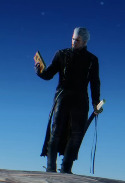
About giving Nero his poetry book, of course. A personal belonging of his that he's personally cherished. And you know...this is actually the most affectionate Vergil has been towards Nero, in his own why. Let me elaborate real quick on why that is.

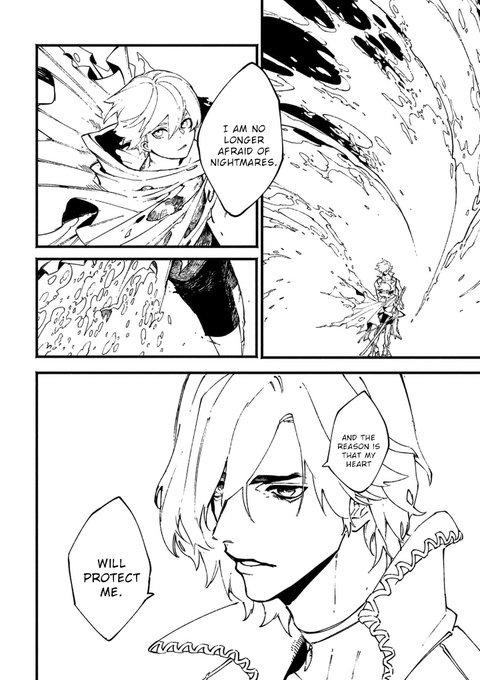
In Visions of V, its established that Vergil sees his poetry book as his 'heart'. Its tied to all the trauma he's suffered at first, but lamenting with his younger self, he realizes that he no longer needs to run from it and instead face it. His Heart will protect him.
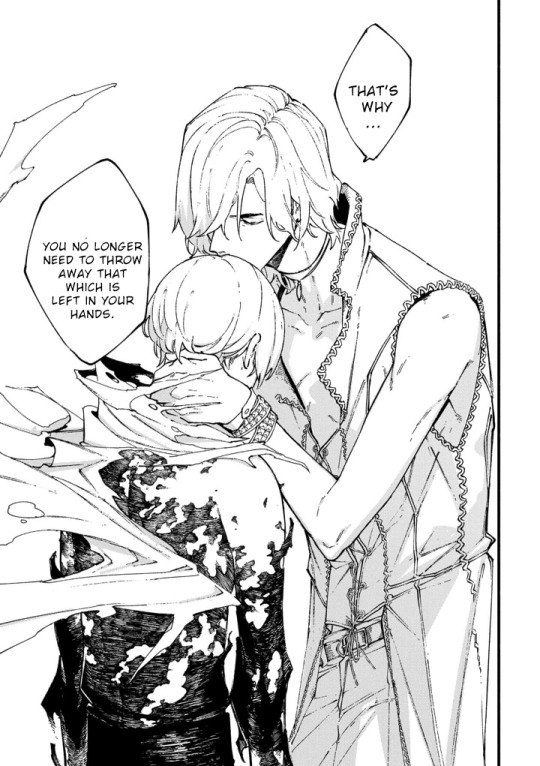
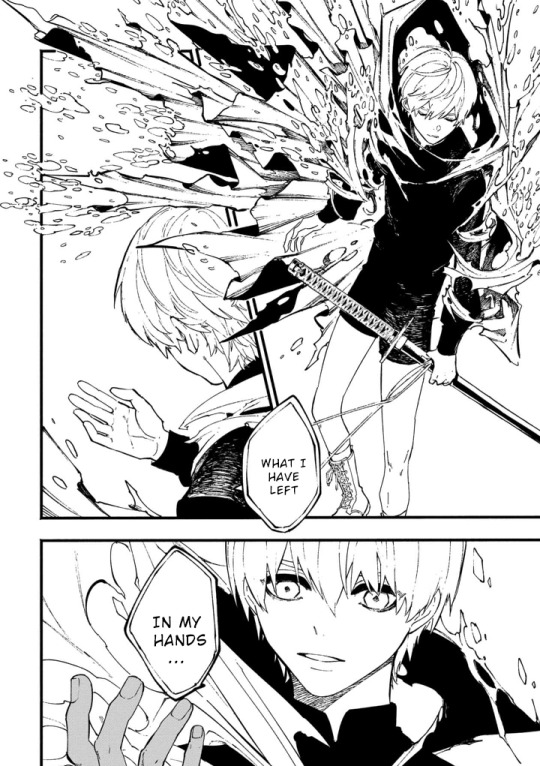
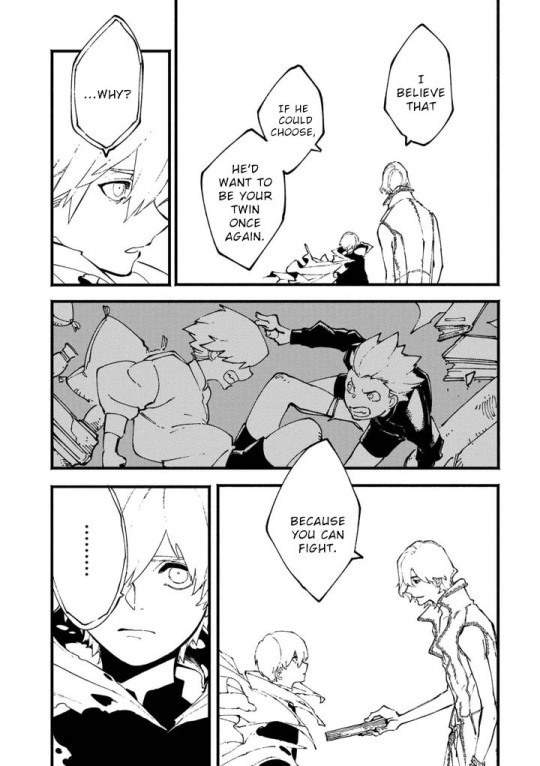
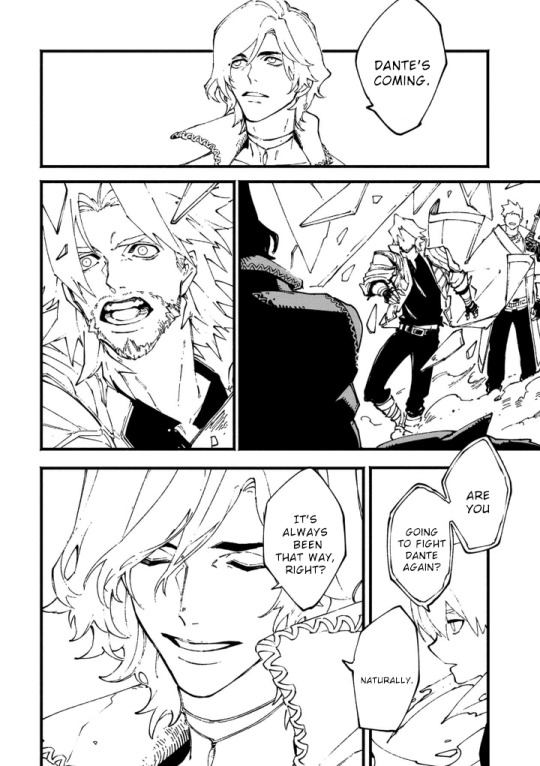
He goes on to say to himself that he doesn't have to toss away what he has left. It goes on, in this moment, to show how Vergil eventually believes deep down that he and Dante can be twins again. It twists the deep sibling rivalry on a more positive spin.
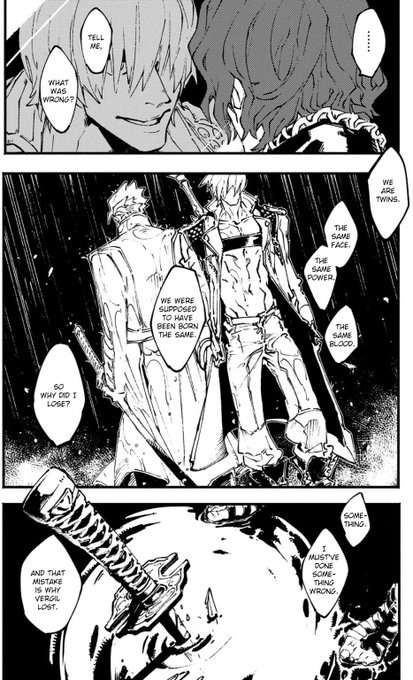
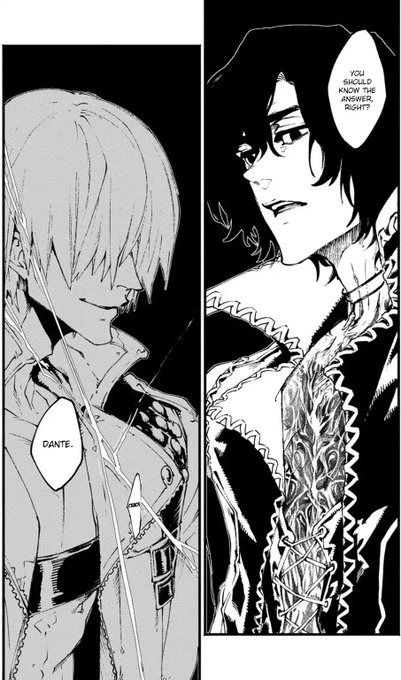
I say positive, because all this time Vergil's been very keen on proving his strength into defeating his little brother who he's lost twice to by this point. As himself (3) and as Nelo (1). Its why he splits himself to gain more power and laments over the whole thing as V.
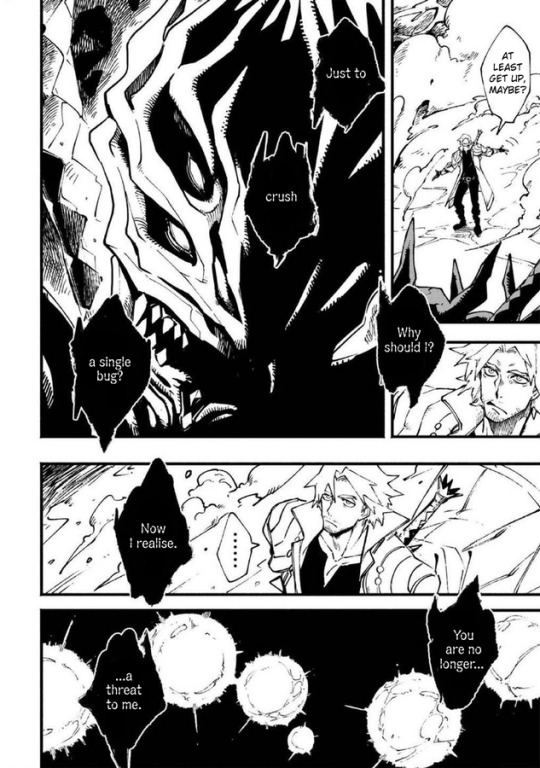
Its why Urizen is so quick to bring up how he's stronger than Dante and no longer has to 'see him as a threat'. He doesn't even have to spare the effort.
Getting back on track, though. Its funny how its stated V's poetry book is his heart, because of how much its tied to not just him, but Urizen. He named Urizen after one of Blake's works after all, the 'Book of Urizen'. Both halves of him are tied to that one book. His heart.
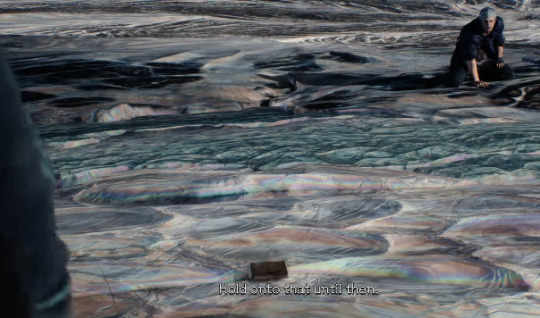
So Vergil spending a moment to ponder and consider giving Nero that same book? Him having a taunt that involves asking himself if he should entrust it to him? And he does? He's giving Nero not just something personally cherished, but essentially a piece of himself as well.
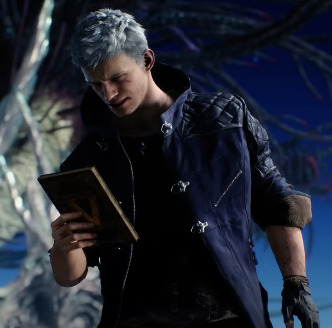
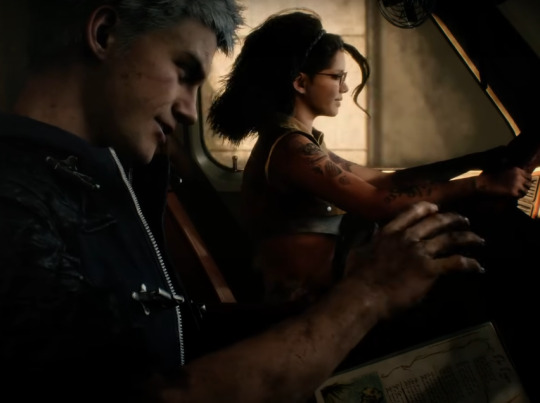
I think the nice bow on top is that Nero picks up the book, very likely recognizes that its the one V was carrying around all the time and realizes just how important it is. Thus, he's actually reading it by the end of the game to maybe understand personally how it was cherished.
Vergil took a minute to decide on giving his son his 'heart', followed through with it, and now Nero is holding onto and 'protecting it' until the day they can one day meet again. Its basically Vergil's own way of displaying a sort of affection towards Nero, the way I see it.
Its the little things I like about these games, ya know...just the things you can potentially pick up when you think about it. Its a shame alot of added context is in a media that you can only read through fan translation (thankfully) and not accessible traditionally, but its a good thing the community has come around to getting a hold of and translating such things for others to read.
#devil may cry#dmc#leo's dmc analysis#I posted this on twitter so I'll cross post it here too#I love the symbolism of Vergil's nerdy book
130 notes
·
View notes
Text


A History of Money
Davies, Glyn. A History of Money: From Ancient Times to the Present Day [1994]. Cardiff: University of Wales Press, 2003, third revised edition, 720 pages. This is an esteemed, comprehensive, scholarly, general history.
The Nature of Money
Ingham, Geoffrey. The Nature of Money. Cambridge, UK: Polity Press, 2004, 254 pages.
Next. Ingham (together with a small group of economists clustered mostly at the University of Missouri in Kansas City) has been revolutionizing the study of money. They have proved that money did not originate from barter, but was instead invented by states, as a means of collecting taxes. This casts an entirely new light on the prospects of getting rid of money: if you get rid of states you might be able to get rid of money too (although they do not draw this conclusion themselves; they argue that since money reflects the power relations in the society, if you equalize the power, money would not be a problem -- to which I raise a very skeptical eye.) This book presents an excellent overview of the debate, as well as being a good introduction to various theories of money.
This new theory of money, the State/Credit theory, is also summarized in:
Wray, L. Randall. Understanding Money: The Key to Full Employment and Price Stability. Northampton, Massachusetts: Edward Elgar Publishing,1998, 198 pages.
Wray, L. Randall. Credit and State Theories of Money: The Contributions of A. Mitchell Innes. Northampton, Massachusetts: Edward Elgar Publishing, 2004, 288 pages.
Knapp, George Friedrich. The State Theory of Money [1905]. San Diego: Simon Publications, 2003 (A reprint of the 1924 translation and abridgement of the 4th German edition of 1923), 306 pages.
Other references on money:
Marx, Karl. "Money," Chapter One, pages 115-238 in the Grundrisse: Foundations of the Critique of Political Economy. Middlesex, England: Penguin/Pelican, 1973, 898 pages.
De Brunhoff, Suzanne. Marx on Money. New York: Urizen Books, 1976.
Bonefeld, Werner, and John Holloway. Global Capital, National State, and the Politics of Money. London: Macmillan Press, 1995, 232 pages.
Hutchinson, Francis, Mary Mellor, and Wendy Olsen, The Politics of Money: Towards Sustainability and Economic Democracy. London: Pluto Press, 2002, 248 pages. This book has an extensive bibliography on money, pages 230-241.
Smithin, John, editor. What Is Money? New York: Routledge, 2000, 276 pages. This is a collection of essays which explores various theories of money.
Arthus, Christopher. “The Concept of Money,” Radical Philosophy, No. 134, Nov/Dec 2005. Abstract online at: <http://www.radicalphilosophy.com/print.asp?editorial_id=19782>
Hess, Moses. “The Essence of Money,” [1845], online at:
<http://www2.cddc.vt.edu/marxists/archive/hess/1845/essence-money.htm>.
Simmel, Georg. The Philosophy of Money [1907]. London: Routledge & Kegal Paul, 1978, 512 pages.
Money and Finance in Capitalism
Arrighi, Giovanni. The Long Twentieth Century: Money, Power, and the Origins of Our Times [1994]. London: Verso, 2010, updated edition, 416 pages. This is an outstanding, scholarly account of the role of money during the past five hundred years of capitalism. It covers the four great cycles of capital accumulation, those based in Genoa, Amsterdam, London, and New York City. Each cycle has two phases: the first based on real production, and the second on financial speculation. This is an absolutely essential read.
Chossudovsky, Michel. The Globalisation of Poverty and the New World Order: Impacts of IMF and World Bank Reforms [1997]. Pincourt, Quebec: Global Research, 2003, second expanded edition, 346 pages. This is a thorough study of how the policies of the IMF and World Bank impoverish the world in order to enrich the capitalist ruling class.
Marazzi, Christian. The Violence of Financial Capitalism. Los Angeles: Semiotext(e), 2011, 136 pages.
Toussaint, Eric. The World Bank: A Critical Primer. London: Pluto Press, 2008, 314 pages.
Payer, Cherl. The World Bank: A Critical Analysis. New York: Monthly Review Press, 1982, 414 pages.
Foster, John Bellamy, and Fred Magdoff. The Great Financial Crisis: Causes and Consequences. New York: Monthly Review Press, 2009, 160 pages.
Hudson, Michael. Super Imperialism: The Origin and Fundamentals of U.S. World Dominance [1972]. London: Pluto Press, 2003, second edition, 425 pages.
Harvey, David. A Brief History of Neoliberalism. Oxford: Oxford University Press, 2005, 247 pages.
Bonefeld, Walter, and John Holloway, editors. Global Capital, National State, and the Politics of Money. New York: St. Martin's Press, 1995, 232 pages.
MacEwan, Arthur. Debt and Disorder: International Economic Instability and U.S. Imperial Decline. New York: Monthly Review Press, 1990, 147 pages.
Bello, Walden, with Shea Cunningham and Bill Rau. Dark Victory: The United States, Structural Adjustment, and Global Poverty. London: Pluto Press (with Food First!), 1994, 148 pages.
Peet, Richard. Unholy Trinity: The IMF, World Bank, and WTO. London: Zed Books, 2003, 250 pages.
Hilferding, Rudolf. Finance Capital: A Study of the Latest Phase of Capitalist Development [1910]. New York: Routledge, 1981, 466 pages.
Debt
The Debt Resistors' Operations Manual. By Strike Debt / Occupy Wall Street, with Common Notions. September 2012, 122 pages.
Graeber, David. Debt: The First 5,000 Years. Brooklyn: Melville House, 2011, 534 pages.
Lazzarato, Maurizio. The Making of Indebted Man: An Essay on the Neoliberal Condition. Los Angeles: Semiotext(e), 2012, 199 pages.
Hudson, Michael. The Bubble and Beyond: Fictitious Capital, Debt Deflation, and Global Crisis. Dresden: Islet-Verlag, 2012, 481 pages.
Hudson, Michael. Finance Capitalism and Its Discontents: Interviews and Speeches, 2003-2013. Dresden: Islet-Verlag, 2012, 274 pages.
Payer, Cheryl. The Debt Trap: The International Monetary Fund and the Third World. New York: Monthly Review Press, 1974, 251 pages.
George, Susan. A Fate Worse Than Debt: The World Financial Crisis and the Poor. New York: Grove Weidenfeld, 1990, revised and updated, 300 pages. A Food First book.
Danaher, Kevin, editor. 50 Years Is Enough: The Case Against the World Bank and the International Monetary Fund. Boston: South End Press, 1994, 207 pages.
Hudson, Michael, editor. Debt and Economic Renewal in the Ancient Near East. For references to many more interesting articles on money, go to Hudson’s web site at:
[http://www.michael-hudson.com/biography.html]
Collinge, Alan Michael. The Student Loan Scam: The Most Oppressive Debt in U.S. History – and How We Can Fight Back. Boston: Beacon Press, 2009, 167 pages.
GATT-Fly, Debt Bondage or Self-Reliance: A Popular Perspective on the Global Debt Crisis. Toronto: 1985, 84 pages (letter-sized).
Usury
Kenneth Couesbouc, “A Short History of Lending and Borrowing Money, It’s a Gas,” online at Counterpunch, September 21, 2007.
Local Currencies
There is a lot of action now around local or alternative currencies. Here are several web sites dealing with this, most of which list other resources and references. Community Currencies. online at: [http://www.ratical.org/many_worlds/cc/]. Local Currency Resources, online at: [http://yesmagazine.org/article.asp?ID=894]. Reinventing Money. established by Thomas H. Greco. [http://reinventingmoney.com]. Complementary Community Currency Systems and Local Exchange Networks. Online at: [http://www.transaction.net/money/community/index.html]. Local and Interest-Free Currencies, Social Credit, and Microcredit. Online at: [http://www.ex.ac.uk/~RDavies/arian/local]
Douthwaite, Richard. Short Circuit: Strengthening Local Economies for Security in an Unstable World. Devon, England: Green Books, 1996, 386 pages. This is probably the most comprehensive overview.
Greco, Jr., Thomas H. Money: Understanding and Creating Alternatives to Legal Tender. Vermont: Chelsea Green, 2001, 295 pages.
Boyle, David. Funny Money: In Search for Alternative Cash. London: HarperCollins, 1999, 228 pages.
Dobson, Ross V.G. Bringing the Economy Home from the Market. Montreal: Black Rose Books, 1993, 235 pages. This is mostly about the Letsystem.
Meeker-Lowry, Susan. "The Potential of Local Currency," Z-Magazine, July/Aug, 1995, pp. 16-23.
Witt, Susan. “Printing Money, Making Change. The Promise of Local Currencies.” Online at: [http://www.ratical.org/many_worlds/cc/promiseOfLC.html]
Cohen-Mitchell, Tim. “Community Currencies at the Crossroads.” Online at:
[http://www.newvillage.net/2commcurrencies.html]
Glover, Paul. “Grassroots Economics.” Online at: [http://context.org/ICLIB/IC41/Glover.htm]
Gifts
Graeber, David. Toward an Anthropological Theory of Value. New York: Palgrave, 2001, 337 pages.
For those who are interested in establishing an anarchist world without money, this is a good place to begin. Graeber tackles the question of the how humans assign value to things (and where prices come from and what are they based on), relying on his extensive knowledge of the anthropological literature to help answer it. A key part of the book is his long chapter on “Marcel Mauss Revisited” (the author of The Gift). Thus the book is directly relevant to the current revival of interest in the so-called "gift economy." It is an extended examination of the “value” question in non-market situations.
Mauss, Marcel. The Gift: The Form and Reason for Exchange in Archaic Societies [1950]. New York: Norton, 1990, 164 pages.
A lot of work is now being done on the idea of a gift economy. Here are some references:
Graeber, David. “Give It Away,” online at:
[http://www.freewords.org/graeber.html]
This essay also includes an account of the group formed in France, of which Graeber is a member, to build off the theories in Marcel Mauss’ The Gift.
Call, Lewis. “Anarchistic Gift Economies in Contemporary Science Fiction,” Anarchist Studies, Vol. 10, No. 2, 2003
Leahy, Terry. “Sociological Utopias and Social Transformation: Permaculture and the Gift Economy,” online at:
[http://www.octapod.org/gifteconomy/content/utopias.html]
See also the links on his web site at:
[http://www.octapod.org/gifteconomy/left.htm[
Brouillet, Carol. “Reinventing Money, Restoring the Earth, Reweaving the Web of Life,” online at:
[http://www.womenswork.org/articles/reinventing.html]
Cheal, David J. Gift Economy. 1988
Vaughan, Genevieve. For-Giving: A Feminist Criticism of Exchange. 1997
Titmuss, Richard M. The Gift Relationship: From Human Blood to Social Policy. New York: Pantheon, 1971, 339 pages.
A Moneyless Society
Nelson, Anitra, and Frans Timmerman. Life Without Money: Building Fair and Sustainable Economies. London: Pluto Press, 2011, 256 pages.
“A World Without Money,” Socialist Standard, July 1979. Editorial Committee.
Rubel, Maximilien, and John Crump, editors, Non-Market Socialism in the Nineteenth and Twentieth Centuries. (St. Martin’s Press, New York, 1987, 187 pages.) "In the nineteenth century, socialists as different as Marx and Kropotkin were agreed that socialism means a marketless, moneyless, wageless, classless, stateless world society. Subsequently this vision of non-market socialism has been developed by currents such as the Anarcho-Communists, Impossibilists, Council Communists, Bordigists, and Situationists." (from the publisher). Included are essays by Adam Buick, Stephen Coleman, Alain Pengam, and Mark Shipway, which ferret out this thin thread of revolutionary thought. There is a postscript describing other resources for each of the five currents discussed, as well as a four-page bibliography. This is a very important book.
Miscellaneous Works
Galbraith, John Kenneth. Money: Whence It Came, Where it Went. Boston: Houghton, Mifflin, 1975, 324 pages.
Polanyi, Karl, Conrad M. Arensberg, and Harry W. Pearson, editors. Trade and Market in Early Empires: Economies in History and Theory. Glencoe, Illinois: Free Press, 1957, 382 pages.
Henwood, Doug. Wall Street: How It Works and For Whom. London: Verso, 1997, 372 pages.
Anarchist Economics Series, compiled by Jon Bekken. List of articles published in the Libertarian Labor Review (which became the Anarcho-Syndicalist Review), with additional references, plus introductory remarks. Online at:
[http://www.syndicalist.org/theory/anarchist_economics.shtml]
Also relevant is the long standing debate over the labor theory of value. The basic question of course is how we are to determine the value of something, in comparison to something else, to serve as a basis for exchange? Or is determining value even necessary for exchange? What about gifts and mutual aid? To begin with, see:
Rubin, I.I. Essays on Marx's Theory of Value [1928]. Detroit: Black and Red, 1972, 275 pages.
Meek, Ronald. Studies in the Labor Theory of Value. New York: International Publishers, 1956, 310 pages.
McNally, David. Against the Market: Political Economy, Market Socialism, and the Marxist Critique. London: Verso, 1993, 262 pages.
This is a brilliant reconstruction of the decades-long dispute between Marx and Proudhon over the market. Marx rejected the market, McNally claims, while Proudhon didn’t. This is an insightful book, and is very helpful in getting a handle on so-called market socialism, of which Proudhon's theories were the first example, McNally claims.
Caffentzis, George. “The Power of Money: Debt and Enclosure,” online at the Commoner, No. 7, Spring/Summer 2003 [http://www.thecommoner.org]. Originally published in Altreeragioni: Saggi e documenti 4, 1995, 23-28. Reprinted in his book, In Letters of Blood and Fire: Work, Machines, and the Crisis of Capitalism, pages 236-240. Oakland: PM Press, 2013, 289 pages.
Birrell, Neil. “Some Notes for an Anarchist Theory of Trade,” The Raven, No. 31, pp. 247-261. Online in Spunk Archive at:
[http://www.spunk.org/texts/pubs/freedom/raven/sp001755.html]
Two books building on the ideas of Henry George are:
Michael Hudson, et.al., A Philosophy for a Fair Society. 1994. And
J.W. Smith, Money. A Mirror of the Economy. 2006
Life Beyond the Market. Special issue of Greenpepper Magazine, out of Amsterdam. See the web site at:
[www.greenpeppermagazine.org]
Bohannan, Paul, and George Dalton, editors. Markets in Africa: Eight Subsistence Economies in Transition. New York: Doubleday,1965, 372 pages.
Sahlins, Marshall. Stone Age Economics. Chicago, Aldine Publishing, 1972, 348 pages.
Hacker, Andrew. Money: Who Has How Much and Why. New York: Scribner, 1997, 254 pages.
Caffentzis, George. Clipped Coins, Abused Words, and Civil Government: John Locke's Philosophy of Money. Brooklyn: Autonomedia, 1989, 246 pages.
McMurtry, John. Value Wars: The Global Market versus the Life Economy. London: Pluto Press, 2002, 277 pages.
Dodd, Nigel. The Sociology of Money: Economics, Reason, and Contemporary Society. New York: Continuum, 1994, 211 pages.
Mandel, Ernest. Power and Money: A Marxist Theory of Bureaucracy. London: Verso, 1992, 252 pages.
Perlo, Victor. The Empire of High Finance. New York: International Publishers, 1957, 351 pages.
Greider, William. Secrets of the Temple: How the Federal Reserve Runs the Country. New York: Simon and Schuster, 1987, 798 pages.
Douthwaite, Richard. The Ecology of Money. Devon: Green Books, 1999, 78 pages.
#reading lists#recommended reading#book lists#money#economics#bibliography#anarchism#anarchy#anarchist society#practical anarchy#practical anarchism#resistance#autonomy#revolution#communism#anti capitalist#anti capitalism#late stage capitalism#daily posts#libraries#leftism#social issues#anarchy works#anarchist library#survival#freedom#James Herod
3 notes
·
View notes
Text
So I already talked about the michael jackson hat dance I'm not gonna reiterate myself. Go here to see my full analysis of that part. TL;DR: Dante is initially standoffish to Nico because she's a new person and he's wary of her because of his own self loathing, and his silly campy cowboy dance is him accepting Nico as a member of the family so to speak. And Nico thinks it's sick hype, she is fangirling out like crazy over finally getting to meet Tony Redgrave himself.
I really like how this is the first scene in the game where the entire main cast is all together! Lady, Trish, Nico, Dante, Nero, and V all together. The gang. The squad. The Devil May Cry family.
Dante calls Urizen "Urizen" in this scene which I think was a localization mistake. Dante really shouldn't know of that name for him, you know? He should think of the demonic enemy we call Urizen for convenience as just being Vergil. I think him using the "Urizen" name is a flub.
The game retconning that the reason Mundus was all that and a bag of chips was because of the fruit of the Qliphoth. On the one hand it makes sense and doesn't step on any toes. On the other hand I always get a little chuffed when a new entry in a series feels the need to "explain" something from a past entry retroactively. "Oh THAT'S why Mundus was the king of the Underworld?" It's not necessarily a problem with this game specifically, it's more of a trend I'm seeing in media in general lately that I've started to become weary of.
The final little exchange between Dante and Nero. It cracks me up that Nero is still salty about being called deadweight when that was a fucking month ago and Dante said it in a very high stress situation. He's still not going to be over it after this either. But as Dante said, he didn't mean that he thinks Nero is useless and would be of no help. The truth is, Dante knows that Vergil is Nero's dad at this point. And Urizen is Vergil. So they're off to kill Nero's dad. Dante doesn't want Nero unknowingly commit patricide. But he also doesn't want to reveal the truth to him. So he's trying every excuse in the book to try and ward Nero off, while all Nero in his youthful immaturity and pride thinks is that Dante is saying he isn't good enough to be able to help. This disparity in their lack of understanding one anothers feelings and motivations will not end here.
11 notes
·
View notes
